The likes of the Cockney Rejects and East End Badoes have penned entire albums recently on the subject of East End gentrification, but for Stewart Home it’s a cause to fight. A one-time Neoist but always a novelist, a quick scan of his books since 1988 reveals a range of titles from The Assault on Culture to The Nine Lives of Ray the Cat Jones, via Blow Job and Cunt, naturally. Stevo met the crophead chronicler of pulp and punk at the foot of the Barbican and repaired to a nearby Spoons to talk Marx and mods.
Text: Andrew Stevens
 It’s the question we all want answering and there are different claims here and there, but were you a skinhead or not?
It’s the question we all want answering and there are different claims here and there, but were you a skinhead or not?
It all depends on how you define a skinhead. If skinhead was a fashion, then maybe I can be considered a skinhead. If skinhead was a way of life, then I definitely wasn’t a skin because I didn’t take it at all seriously – beyond a stress on dressing well and deploring scruffy boneheads. It was more a case of ‘I am nothing therefore I must become everything’… I certainly wouldn’t want to strait-jacket myself into just being a skin. To paraphrase Marx, it is possible to be a gay skinhead in the morning, a soul girl in the afternoon, a cis punk rocker in the evening, and a mod after dinner, without ever becoming a skinhead, soul girl, punk rocker or mod!
How important was it then for Terry Blake to be a skin in Defiant Pose?
I’d already done punks in my first novel Pure Mania and hippie or goth wouldn’t have worked. Plus, I wanted a cartoon anti-hero the literary establishment would instantly dislike. What was important was he appeared obnoxious from certain perspectives and making him a skinhead helped with that. But maybe I should do Defiant Pose II in which a middle-aged Terry is an anarcho-Satanist choirmaster for a Russian Orthodox church in central London!
Were all those women’s phone numbers in the novel really those of London police stations?
They were when I wrote the novel but the editor at Peter Owen tried calling them and when he got abusive replies from men who weren’t the ‘hot’ women who slipped Terry their contact details in the book, he changed them. I was aware that there are sexist morons out there who try calling numbers they hear in songs or see in novels that supposedly belong to mythical creatures called ‘nymphomaniacs’ in our society, and I thought it would be funny to point any sad misogynists among my readers in the direction of some cop shops. Strangely my editor at Peter Owen didn’t seem aware that he’d been calling the filth, so it did make me wonder what he’d been saying and hoping for when he belled my original numbers.
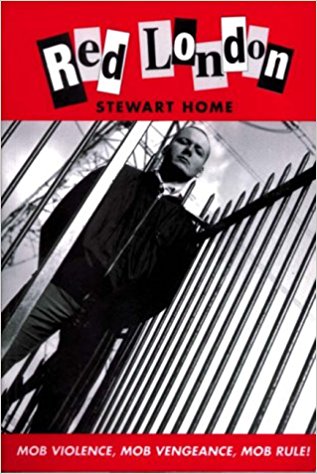 The skinhead motif continued with Red London and the ‘Skinhead Squad’. Was the title from the Sham song?
The skinhead motif continued with Red London and the ‘Skinhead Squad’. Was the title from the Sham song?
Yes, of course, Defiant Pose, Red London and Blow Job, were conceived as a thematic trilogy; although the characters don’t overlap they are pretty interchangeable. Defiant Pose was a Cortinas single, Red London came from Sham 69 and Blow Job from Chaotic Discord (although I also knew it as the title of an early Andy Warhol movie). There were also skinheads in Slow Death. I was exploring sexuality and its relationship to politics in all those books, so the gay skinhead scene was also a factor in that. But in the thematic trilogy, I was also interested in the close relationship between anarchism and fascism.
Slow Death was done as a kind of perfect version of what I’d been working with in my first four novels but like Pure Mania falls outside the trilogy. But all these books were among other things a kind of post-modern and often critical take of New English Library youthsploitation fiction. I was always as interested in NEL’s Hell’s Angels and other books as the skinhead titles of Richard Allen. In fact, the ones that totally blew me away when I first read them when I was 12 in 1974 were the Mick Norman biker books in which the gay Angels were harder than the straight Angels, and after the demise of the Angry Brigade, the bikers were the only hope for freedom in the UK.
Of course, since Slow Death I’ve published ten novels which didn’t feature skinheads, so I do have many other interests and that type of youth culture isn’t even a dominant theme overall in my fiction. To clarify, the books weren’t always published in the order I wrote them but my interests moved on and even if Blow Job was published after Slow Death, it was written before it.
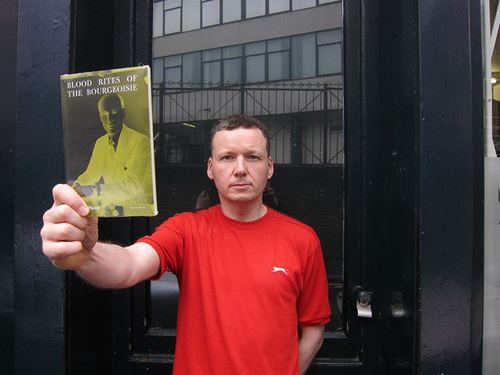 How did you come across Baron’s Court, All Change and end up involved
How did you come across Baron’s Court, All Change and end up involved
in its republication?
When I started really looking into my mother’s life at the turn of this century, one of the things I did was get her papers from my auntie and start talking to a lot of her friends about her and the people around her. Terry was a part of her inner circle. I had my mother’s address book and gradually tracked people down. Obviously, my mother had been dead for more than twenty years but for a lot of people, her address book gave pretty solid leads.
Nearly everyone had good things to say about Terry, and it quickly became clear that among the cognoscenti of the 1960s London counterculture he was an utter legend. When I re-read Tony Gould’s Inside Outsider, I discovered the couple of pages about Terry which I’d read years before but didn’t recall. They detailed the fact Terry was the inspiration for the unnamed narrator in Absolute Beginners.
I think by that time I’d already tracked down a sixties paperback copy of Baron’s Court for the princely sum of 20p on used book stall. Quite a bit later I acquired a copy of the hardback for 80p on eBay. When I read the book I thought it was great, so I made several hundred photocopies of the paperback and passed them around. Back then when the book turned up it was cheap because no one really knew what it was, but it didn’t turn up very often.
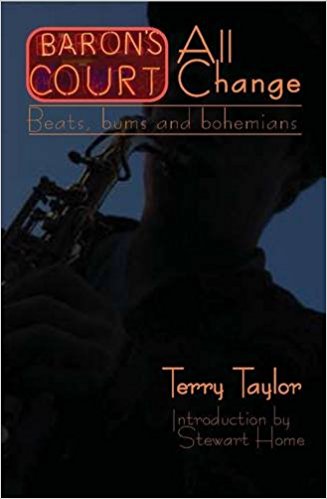 Because I loved Baron’s Court so much, on 14 February 2007 I added a page about it to my website. I described it as a super-hip tale of drug dealing and the very early mod scene, a world both Terry and my mother knew well and quoted some nice chunks from it. I was rather surprised by the effect this had: when the next used copy was offered for sale, the dealer flogging it wanted several hundred pounds rather than the small amounts I’d paid to acquire the two different editions I had.
Because I loved Baron’s Court so much, on 14 February 2007 I added a page about it to my website. I described it as a super-hip tale of drug dealing and the very early mod scene, a world both Terry and my mother knew well and quoted some nice chunks from it. I was rather surprised by the effect this had: when the next used copy was offered for sale, the dealer flogging it wanted several hundred pounds rather than the small amounts I’d paid to acquire the two different editions I had.
I also had people tracing my 80p eBay buy – I don’t use my own name on my account – and asking if I’d sell them my copy of Terry’s book via that platform. I even had a book dealer email me via my website to say next time I found an obscure novel to champion could I please make it something less obscure, he’d been in the trade for 30 years and this was the first time he’d come across a title he’d found it impossible to source.
In the meantime, I’d not had much luck tracing Terry. There were a couple of out of date addresses for him in north Wales in my mum’s address book. When I had no luck with those, I wrote to everyone on the electoral roll in north Wales and across the border in north-west England with his or his wife’s name. Terry Taylor is a common name so I had to send an awful lot of letters with return stamped addressed envelopes enclosed but still had no luck finding him.
Eventually, Terry contacted me via my website to say a friend of his had hipped him to what I’d written about his book and he liked it. So we started talking on the phone and eventually met. I’d also succeeded in generating lots of interest in this lost classic, the buzz had reached Ross from Five Leaves Publishing who was interested. I sent him a photocopy of the book, and then put him in touch with Terry when he decided he wanted to reissue it. So that’s how the New London Editions reissue came about.
He had another book ready to go too?
Terry told me on the phone that he’d written other novels but the second was lost. He did, however, have a copy of his third book called The Run. It was written in the early seventies and covers the same territory as Esther Freud’s Hideous Kinky but from a hipster adult and contemporary perspective. Terry sent me an old manuscript copy which had obviously been bound up back in the seventies. I thought it was great and ought to be published.
With Baron’s Court the publishers made Terry fill in the backstory about the narrator’s sister Liz in 1950s kitchen sink style, but that’s less interesting than the rest of the book and Terry wouldn’t have bothered with it if his editor hadn’t said he had to add that material if he wanted his novel published. With The Run everything is pure Terry. I thought the book could do with a light edit and talked about that with him, but it needed much less revision than most books go through before they’re published. He decided to rewrite it, which he did, although I’ve never seen that revised version. Hopefully one day it will be published – but that’s down to Terry’s family now because sadly he died in 2014 at the age of 81.
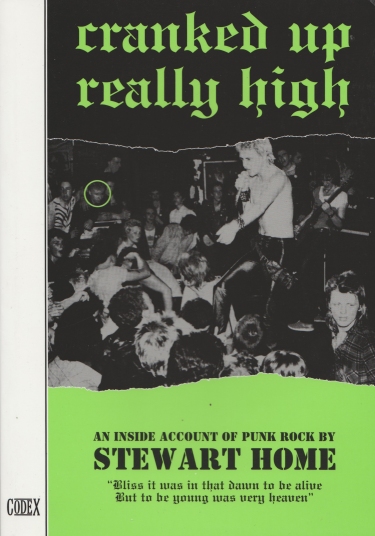 Did you really write Cranked Up Really High in two weeks?
Did you really write Cranked Up Really High in two weeks?
I think it was three weeks. Anyway, it didn’t take long. I’d spent years listening to punk rock and thinking about it, so I didn’t want to waste too much time writing about it. I’d thought through everything in advance and I just went flat out. It isn’t a long book. My early novels took about two months to write. A month to write the first draft and a month to do two revisions of that draft. But I did first to third draft of Cranked Up Really High in three weeks.
Of course, all the books go through an editorial process later where they get slightly more cleaned up – but mostly for me that’s typos, there generally isn’t too much that needs changing after a third draft. I wanted Cranked to be ‘louder/faster/shorter’ than other books on the subject. I’m still proud of it – and the subtitle ‘Genre Theory & Punk Rock’ tells you what exactly what it is about.
Moving on, what can really slow a book down is needing to do research as you go along. One of my 2018 books, Re-Enter The Dragon: Genre Theory, Brucesploitation and the Sleazy Joys of Lowbrow Cinema, took two years to write because I had to watch and re-watch so many movies to do it. I’d been watching Brucesploitation flicks for years but started doing so systematically in 2015 to make my show for Glasgow International in 2016. I did so much research that even before the show was up I figured I might as well turn it into a book. Nonetheless, it still took a long time, far longer than I’d planned.
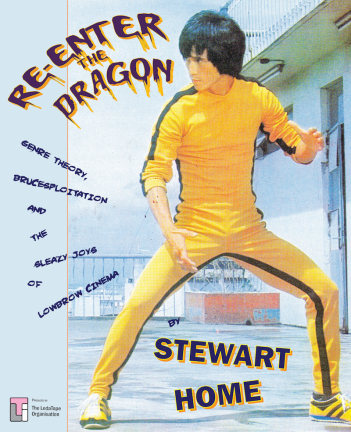 As with Cranked, I’m looking at a subject from the perspective of genre theory, so I see those two books as being linked and relating to each other. Ironic, then, that the production times for each were very different. Re-Enter is almost three times as long as Cranked, in fact, it will be the longest book I’ve published to date, so I didn’t really achieve brevity in this instance either.
As with Cranked, I’m looking at a subject from the perspective of genre theory, so I see those two books as being linked and relating to each other. Ironic, then, that the production times for each were very different. Re-Enter is almost three times as long as Cranked, in fact, it will be the longest book I’ve published to date, so I didn’t really achieve brevity in this instance either.
I still find it strange that no one had really applied genre theory from film to punk rock when I did Cranked in the 1990s, since it was such an obvious thing to do. Likewise, there’s so much misinformation about Brucesploitation flicks and most of the writing on the subject in English is fan based, so no one has been very rigorous to date about looking at it from the perspective of genre. I’ve tried to correct that with Re-Enter The Dragon.
In Cranked you go to town on the Last Resort in it, particularly over ‘Skinheads in Sta-Press’. Has your view changed all these years on?
More than 20 years on I don’t feel much different about the Last Resort and the other Oi bands than what’s in the book. Obviously, the good thing about them is that they wound up the posers who wanted to intellectualise punk. What’s surprising with the Last Resort is how much impact they had given how little they did first time around. They only played a handful of gigs and didn’t record their tunes too well either.
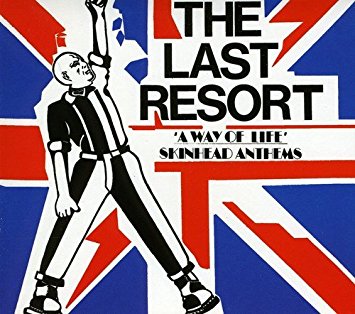
As I say in the book, they were a logical extension of what bands I liked and saw in the seventies did – like Slaughter and the Dogs, Sham and Menace. But I don’t think the Oi bands were on the whole as good as those acts. Too much of the music is so badly recorded and so much of it sounds like arrangements by numbers too – the 4-Skins before Roi Pearce joined the band are even worse on this score than the Last Resort. Musically the best Oi bands were those on the left of the political spectrum – The Oppressed were interesting for their use of electronic drums and Blaggers ITA had a sophisticated song arranger in the form of Brendan Hodges once he joined.
Those on the scene like Roi Pearce who wanted to be apolitical never managed to steer that course too well. Personally – and this is partly because I was born in the early rather than mid-sixties – I was much more into the late-seventies wave of punk rock and never bothered to see any of the Oi bands. My preference is still for the earlier stuff, although I’ve always listened to lots of soul and disco and other kinds of music too. I’m not interested in seeing the reformed versions of these bands either.
I think the best live band regularly playing London in the late-seventies was Adam and the Ants, who I saw many times between 1978 and 1980. Whatever you think of the later pop Ants, Adam was always an incredible performer.
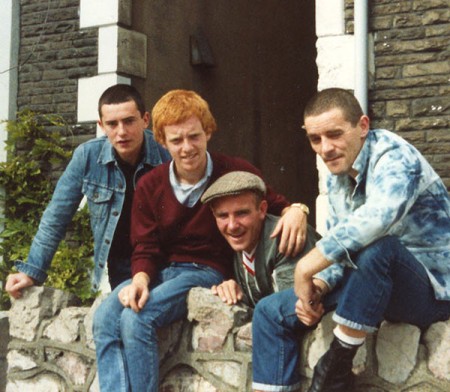
What really sticks in my mind from the late-seventies are the bands that visited the UK and I only saw once including the Dead Boys, Dictators, Radio Birdman, Pure Hell and Destroy All Monsters. Because I only saw one gig by those acts I have clearer memories of seeing them perform – because if I saw a band 10 or 20 or more times, and I saw many bands as much as that, the different gigs can get mixed up in my head. Seeing those visiting bands seemed like something special coz I couldn’t go and see them week in and week out. Also, they got really bad receptions here, particularly the Dictators and the Dead Boys coz I saw them both in 1977, the others in 1978. In 77 US bands who weren’t the Ramones would get chants of ‘I’m So Bored of the USA’ and similar abuse.
All the worst elements of Oi can be found on the first Clash album – apart from the use to which ‘I’m So Bored of the USA’ was put and the fashion-conscious nationalism that was so evident among their fans, think of Strummer’s lyrics like “I don’t care if I’m beat up by any kebab Greek” or “Do you think I’m a raving idiot just got off the boat, step in line, sign this form, you ain’t got a hope…”
I judged bands on whether they could rock and the Dictators were the most amazing sonic force I’d seen up to that point, but most of the audience just reacted to the fact they had the wrong clothes and haircuts and weren’t British. It was sickening. Same goes for the Dead Boys who were also great.
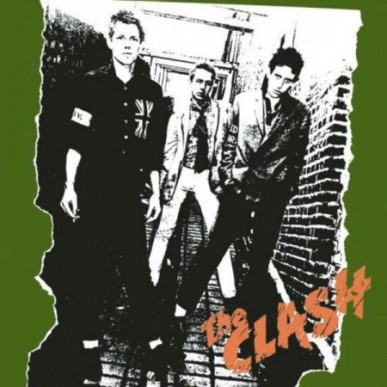
I recently saw the Radio Birdman documentary Descent Into The Maelstrom and I felt it didn’t emphasise enough how they just looked wrong to succeed in England in 1978 because everything was still such a fashion parade – even if not as bad as the previous year. If Birdman had come to England a couple of years later like the Birthday Party they’d have done much better, I’m sure.
I loved them, but they were just met with so much indifference. The fact they had the support slot on that Flamin’ Groovies tour which was curtailed due to Cyril Jordan being sick can’t have helped either. I thought the Maelstrom documentary should have gone more into those issues rather than spending so much time on the Birdman reformations… I don’t recall the Groovies even being mentioned in it, which is a bit of an oversight.
That said, there were some great quotes from the band in the film – I loved the one about Chris Bailey of the Saints, viz: ‘like Paul Weller he had a well-balanced personality, a chip on both shoulders’.
But to return to Oi, I just view it as hypocrisy when you see how a lot of people who are huge fans of the Clash criticise this scene for things that should also be applied to many of the earlier London punk bands. There are elements of Oi that I’d rather have not seen in punk rock at all, but the same things run through the Clash (and the Sex Pistols, who I don’t see as a punk band anyway) so if you’re gonna criticise Oi for this then you should also criticise the earlier punk acts too. That said, I’d rather listen to the Blaggers or the Oppressed than the Clash.
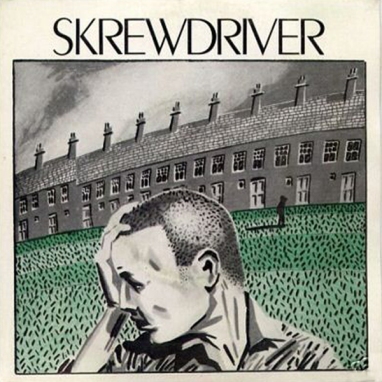
And the right? Cranked Up Really High gave some detailed consideration to the likes of Skrewdriver and No Remorse.
I felt that I should cover Skrewdriver to show how pathetic they were and because outside of far-right circles few people knew much about them in the mid-nineties. I also needed to deal with that scene because it represented the evolution of one strand of punk. Now with the internet, there’s a lot more information freely available on the subject, as well as a lot more disinformation, so you have to read critically.
Fortunately, there is no need for me to keep up with musically inept bands with fascist politics because others are covering the ground and I’m happy to let them do it. I was very impressed with the way the Who Makes The Nazis blog exposed fascist musicians. Sadly they stopped posting new stuff five years ago. I’m glad Alexander Reid Ross is doing what he’s doing on a broader field, although he is very slapdash about details and I do wish he had the attention to detail and political understanding of Who Makes The Nazis. Nonetheless, it’s still good he does what he does.
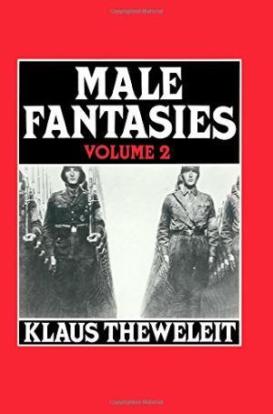 So I’m lucky that there’s no need for me to keep up with what shitty fascist musicians are doing and I can focus on other things instead. Of course, I do keep an eye on what’s happening across the entire political spectrum and as my early novels show, I was keen for people to understand the relationship between anarchism and fascism and that anarchism is not necessarily a movement of the left, but had a big impact on the politics of the far-Right. This is something that was also being addressed by historians like Zeev Sternhell in books such as The Birth of Fascist Ideology around the same time I wrote my early novels.
So I’m lucky that there’s no need for me to keep up with what shitty fascist musicians are doing and I can focus on other things instead. Of course, I do keep an eye on what’s happening across the entire political spectrum and as my early novels show, I was keen for people to understand the relationship between anarchism and fascism and that anarchism is not necessarily a movement of the left, but had a big impact on the politics of the far-Right. This is something that was also being addressed by historians like Zeev Sternhell in books such as The Birth of Fascist Ideology around the same time I wrote my early novels.
In Defiant Pose, Blow Job and Red London, I was also very much applying Klaus Theweleit’s ideas about the malformation of the fascist ego from the two volumes of Male Fantasies to the anarchist characters in my books. Those who thought I wanted readers to identify with these fictional anarchists totally misunderstood my work. I wanted people to see the flaws in the political thinking of these characters and to understand them as relating anarchism to fascism. Given how critical I am of anarchism in those books and in a lot of non-fiction I’ve written since, it is extraordinary how frequently I’ve been smeared as somehow being an anarchist.
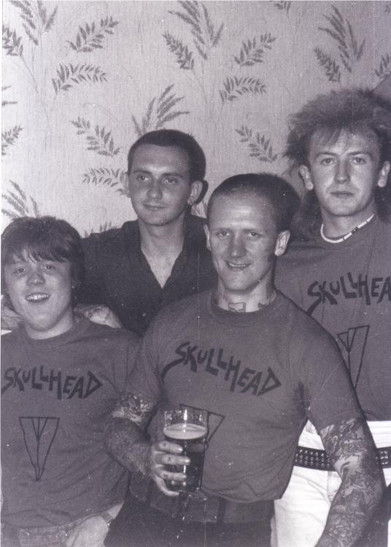
Defiant Pose mentions Skullhead’s ‘Blame the Bosses’ and its, erm, interesting views on race as a product of capitalism.
Skullhead went further with the third positionist line of the official National Front in the eighties, all that political soldier nonsense propagated by Derek Holland and Patrick Harrington, than most other white power bands. However, their view wasn’t that race is a product of capitalism, that’s closer to my own perception that race isn’t real but is experienced as real because of racism, than any Skullhead song lyric.
Skullhead were reactionary racists who took a Strasserite ‘left’-fascist position of ‘blaming the bosses’ for the fact they didn’t live in a fantasy British Aryan utopia that has never existed and never will! They might as well have blamed Mother Teresa or Nobby Stiles, although Skullhead had only themselves to blame for the fact they were completely deluded. Scientifically it’s impossible to distinguish between different races, but that doesn’t stop mystical cretins like Skullhead wallowing in racist crap! Retarded is a more suitable description of Skullhead’s propaganda than interesting.
This all took place in the zone you created in the novel, Hackney, Newham and Tower Hamlets?

For the fascists in the book those areas made up Cockney Nation and that was a parody of the official National Front of the time with their endorsement of the Europe of 100 Flags or Europe of 100 Regions ideology, even if that sort of thing was more prominently featured in so-called intellectual fascist rags like Michael Walker’s The Scorpion than National Front News. Of course, those ideas originated with Yann Fouere and around things like the Celtic League and were appropriated by the official NF. Naturally, my own views are anti-nationalist but I certainly don’t see nationalism and fascism as necessarily identical.
But to move on, what I think is more interesting is the choice of locations in my early books. Pure Mania is partly set on the Teviot Estate in Poplar, where I had my first council tenancy in the eighties. Defiant Pose centres on the Samuda Estate on the Isle of Dogs and Red London in the row of terraces on the Bethnal Green/Bow Border in Grove Road that were demolished so that the land they occupied could be incorporated into Mile End Park, and that temporarily provided a location for Rachel Whiteread to do her ridiculous House piece.

I know all those places well because I’ve lived in them. Now they are real focuses for anti-gentrification struggles against the displacement working-class communities. Obviously, the Teviot borders Balfron Tower and there’s been a lot of ink spilt about what’s happened there, and what currently looks like a more successful struggle to defend neighbouring Chrisp Street Market. There’s also been plenty of news coverage lately of the demolition of Robin Hood Gardens, and that lies between the Teviot and Samuda Estates, it’s also somewhere I used to visit a lot right through the eighties coz I had friends living there.
 When you read some of the activist stuff – and particularly the art activist stuff – about recent struggles in Poplar against gentrification, it really feels like many of those who’ve got involved and who are doing good things around that have little idea of what the place was like in the twentieth century. I got my first council tenancy on the Teviot because people really didn’t want to live there in the eighties, and it had the reputation of being the worst council estate in east London. I once told a social worker from the Midlands who I met somewhere that I lived on the Teviot and he freaked out because of what he’d read about the place in the Guardian.
When you read some of the activist stuff – and particularly the art activist stuff – about recent struggles in Poplar against gentrification, it really feels like many of those who’ve got involved and who are doing good things around that have little idea of what the place was like in the twentieth century. I got my first council tenancy on the Teviot because people really didn’t want to live there in the eighties, and it had the reputation of being the worst council estate in east London. I once told a social worker from the Midlands who I met somewhere that I lived on the Teviot and he freaked out because of what he’d read about the place in the Guardian.
So while these books are fiction they provide a kind of pre-history to anti-gentrification struggles that I couldn’t have even imagined taking place when I was writing them. After Pure Mania came out someone local told me how much he liked the novel because no one else wrote contemporary fiction set in places like Chrisp Street Market. That said, the local council didn’t seem to like what I was doing, coz when they did a library promotion to supposedly support all local authors living in Tower Hamlets, I wasn’t included. And to clarify, I only lived on the Teviot for ten years, coz I was on the top floor of a block and when the roof above my flat came apart the council rehoused me in Shoreditch. Still, I think ten years living and a lot more years visiting the place is good enough to know it pretty well.
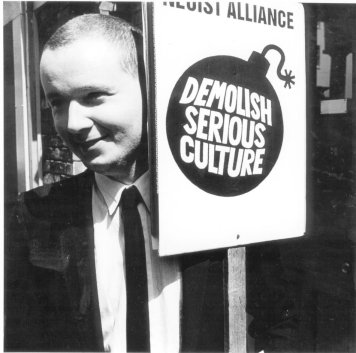 You’re now quite involved in various resident-led campaigns against estate regeneration?
You’re now quite involved in various resident-led campaigns against estate regeneration?
I try to keep an eye on regeneration across London since there are a lot of campaigns and struggles that would be even stronger if they were linked up. There is a lot of interest in these issues as can be seen from media reportage. There’s a need to engage with the bigger issues as well as opposing specific schemes.
In Inner London, there is not really a shortage of housing but rather a shortage of affordable housing. The problem is property investment and the housing market bubble. There are an incredible amount of ghost homes around, luxury apartments sold to investors who leave them empty in the belief that an overheated property market will generate them a profit. For some, this is just a question of getting money out of countries where they fear the government might take it away from them at some point. For such people, it doesn’t really matter if the value of their investment goes down, for others it does.
So the decline of up to 15% in house prices in London in the past year doesn’t put all ghost home investors off buying – and property in our city still remains massively over-valued in monetary terms. The government is making matters much worse with its stupid policies such as the help to buy scheme which further inflates housing prices. What we need is cheaper housing not necessarily more of it. It’s obscene to see people sleeping on the streets when there are empty ghost homes all around them, and you can see that every night of the week where I am. So the bullshit all the main political parties come out with about the so-called ‘housing crisis’ needs challenging.
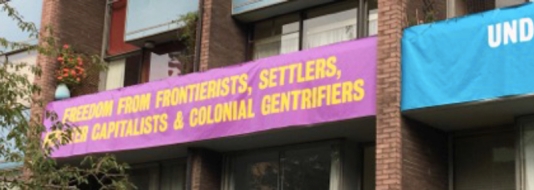 Then there’s the specific developments that need challenging. I contributed to the Spectres of Modernism protest, against 110 social housing units for key workers being replaced by 99 luxury apartments with no on-site social or affordable housing provision and with the developer getting a massive reduction on their off-site Section 102 contribution. The exploitation of viability loopholes to get out of providing social benefits is a scandal that needs redress. Anyway, information about Spectres of Modernism can be seen at its website.
Then there’s the specific developments that need challenging. I contributed to the Spectres of Modernism protest, against 110 social housing units for key workers being replaced by 99 luxury apartments with no on-site social or affordable housing provision and with the developer getting a massive reduction on their off-site Section 102 contribution. The exploitation of viability loopholes to get out of providing social benefits is a scandal that needs redress. Anyway, information about Spectres of Modernism can be seen at its website.
Just up the road from that, there’s the proposed redevelopment of the Finsbury Leisure
Centre site by Islington Council. This is a more complex issue because it is claimed mixed social and private housing will come out of it. The market priced private housing is supposed to fund everything else. However, as time goes by the amount of social housing goes down and private market price provision goes up.

Another problem is the plan to demolish the old building and place a much taller housing block where it is. The proposed new building will overshadow St Luke’s Garden and adjacent social housing. Since there is little green space in the area and the other park in the hood, Fortune Street, is set to lose all afternoon sunlight between September and March due to the development Spectres of Modernism was protesting against, this is a big issue for those who live or work in the area. We’re keen for Islington to build more social housing but if the Finsbury Leisure Centre space is going to be a site for that then obviously a tall block of flats should only be sited against Central Street and away from St Luke’s Garden, that is where there are currently football pitches. Likewise, we don’t really want over-priced private flats, we’d much rather see all social housing.
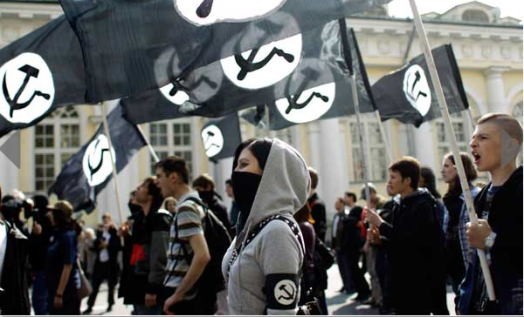
Finally, Blow Job came to grief from the National Bolsheviks in Russia?
I don’t speak Russian so I’m relaying what my Russian publisher Alex Kervey of Tough Press and others have told me. When I wrote Blow Job I included passages satirising National Bolshevism although there wasn’t anyone who could be strictly described as adhering to this tendency among UK or North American fascists. There were odd far-Right ‘intellectuals’ in the UK who every now and then would get rather excited about both National Bolshevism and figures like Julius Evola.
But on the Anglo-American fascist scene at the time I was writing, National Bolshevism was pretty obscure and few would have known its adherents – who included Ernst Jünger – saw themselves as occupying a position to the right of Hitler and viewed Nazism as too plebeian and insufficiently aristocratic for their tastes. So part of the joke of including it in the book was its obscurity to English speakers! Obviously, I wasn’t thinking about Blow Job being published in Russian – or indeed German – when I wrote the novel but by the time it was there was a relatively large National Bolshevik movement in Moscow and elsewhere; its leadership were deeply offended by my parody of their creed.
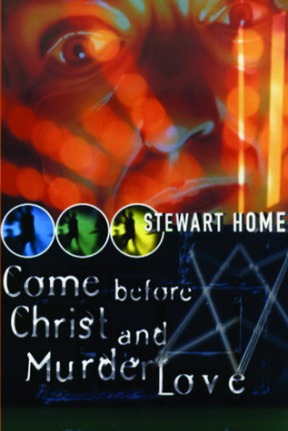 Then when Come Before Christ & Murder Love came out in Russian, the National Bolsheviks wound up Orthodox fascist groups by telling them I was blaspheming and praising Satan in this new novel. There was some long-winded legal process against the Come Before Christ for being anti-Christian and my publisher’s office was petrol bombed. As a result, there were delays to Russian translations of my other novels being issued. In fact, quite a number of planned releases never saw publication in Russia, although a handful more novels did trickle out after the legal action against Come Before Christ ran out of steam. There’s stuff about this on Wikipedia and probably other places online in English that I assume has been put together by people who speak Russian.
Then when Come Before Christ & Murder Love came out in Russian, the National Bolsheviks wound up Orthodox fascist groups by telling them I was blaspheming and praising Satan in this new novel. There was some long-winded legal process against the Come Before Christ for being anti-Christian and my publisher’s office was petrol bombed. As a result, there were delays to Russian translations of my other novels being issued. In fact, quite a number of planned releases never saw publication in Russia, although a handful more novels did trickle out after the legal action against Come Before Christ ran out of steam. There’s stuff about this on Wikipedia and probably other places online in English that I assume has been put together by people who speak Russian.
Stewart Home’s solo exhibition Dual Flying Kicks is on at Five Years Gallery in London 1-17 June 2018. SEND CA$H: The Collected Poems of Stewart Home is published by Morbid Books in May 2018. Re-Enter The Dragon: Genre Theory, Brucesploitation and the Sleazy Joys of Lowbrow Cinema is published by The LedaTape Organisation in May 2018.
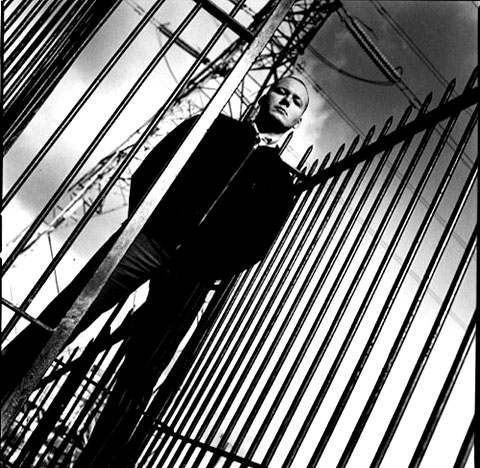
Pingback: Children of the Sun: an Interview with Max Schaefer – Creases Like Knives
Pingback: An interview with Stewart Home: youth cults, pulps and, of course, Marx – Crombie Media
Pingback: Classic skinhead books: 1970-2000 – Crombie Media
Pingback: Un'intervista con Stewart Home: sottoculture, pulp e, ovviamente, Marx – Crombie Media Blog
The many, many opinions held by Stewart Home are legitimate only in his mind. To the rest of us (who were “there”), he’s just a muppet who puffs himself up by having a critical view of what most consider true, e.g.; “the Sex Pistols aren’t a punk band”, hahaha – beyond ludicrous. Now apply that to just about everything that comes out of his mouth. Oy vey.
LikeLike
Pingback: Classic albums: ‘The United Colors of Blaggers ITA’ – Creases Like Knives